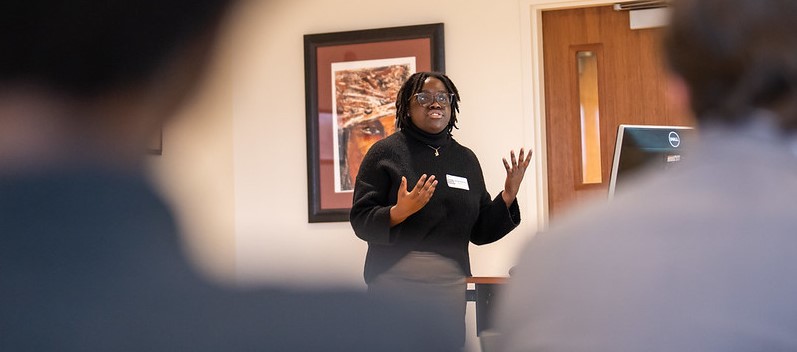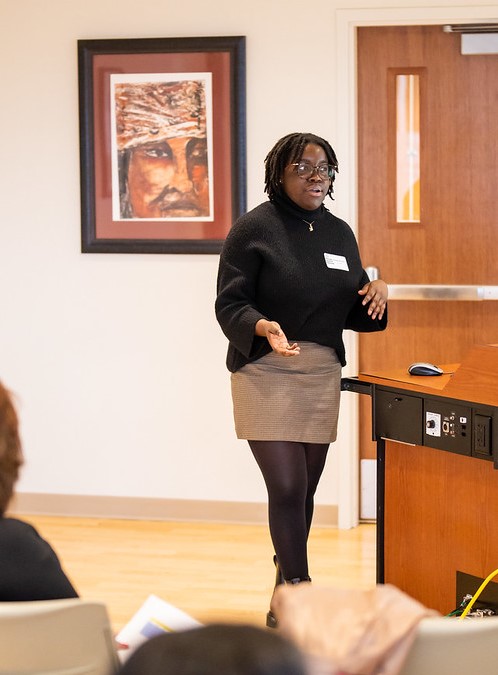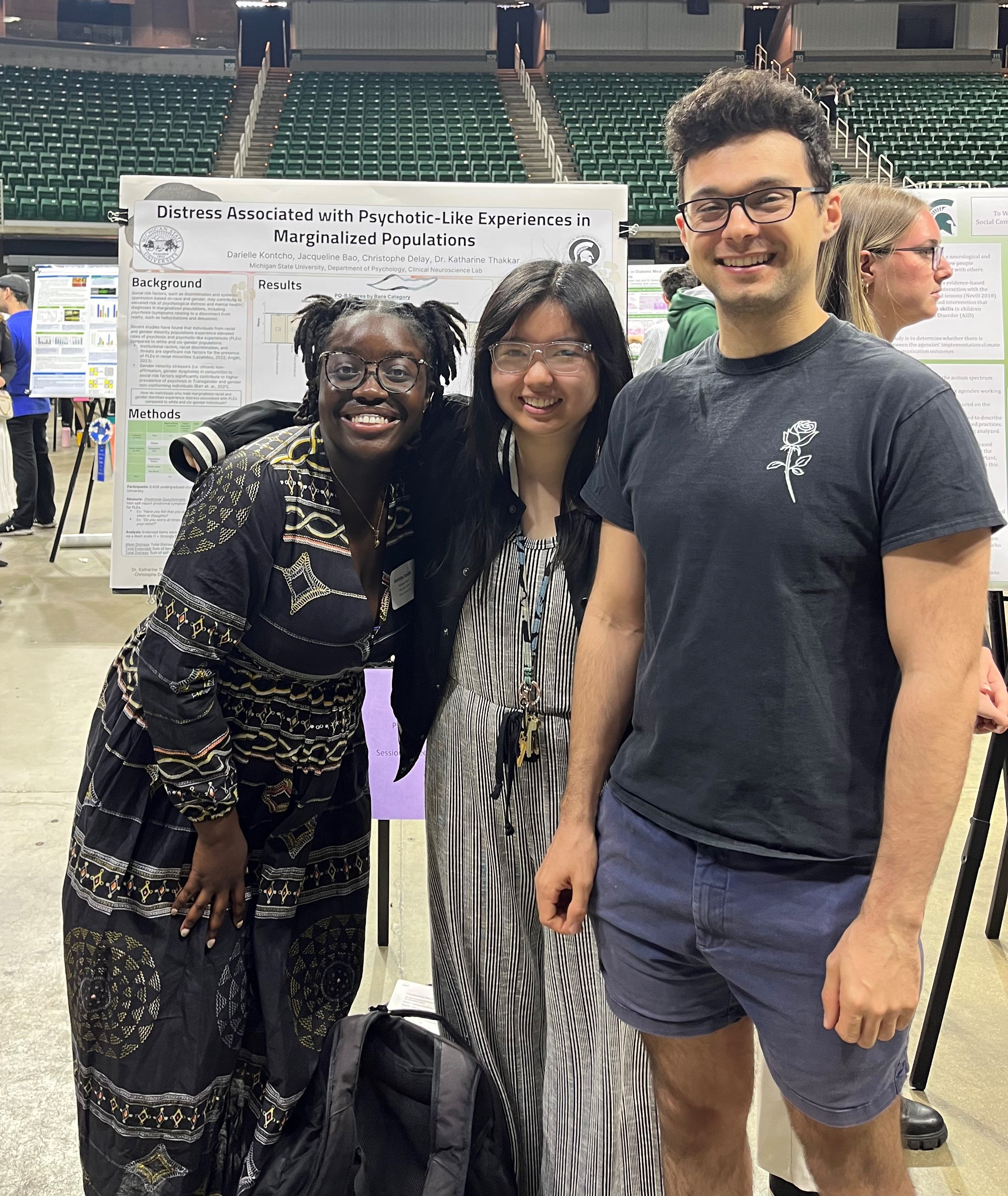PSY Student Researcher: Darielle Kontcho
August 24, 2023 - Shelly DeJong

Darielle Kontcho, is a 3rd year student from Erlanger, Kentucky, majoring in Psychology with a minor in Cognitive Science. Darielle sat down with us recently to talk about switching majors in times of uncertainty, how research can give you the opportunity to discuss significantly underrepresented topics, and how she hopes to continue to help people in her future endeavors.
How did you end up in psychology?
Upon joining MSU, I initially pursued a Human Biology major on the pre-med track. However, during my second semester, I started to notice that I was no longer finding enjoyment in the material I was studying, and this began to have a significant impact on my mental well-being. As someone who deeply values learning and personal growth, losing my passion for learning became an incredibly challenging experience.
During that time, I had the opportunity to work as a professorial assistant in Dr. Katharine Thakkar's Clinical Neuroscience Lab through the Honors College. This experience was instrumental in helping me recognize my genuine interest in the field and the fascinating research being conducted. Additionally, I couldn't help but notice the lack of representation of individuals who looked like me and shared my background within the field of psychology. This realization served as a powerful motivation for me, as it became evident that I could make a significant impact in this field and contribute to increasing diversity.
Nevertheless, transitioning from the pre-med track to psychology was a daunting task, given the considerable investment I had made in pursuing medicine. It required careful consideration and the willingness to embrace a new path, which was both exciting and challenging at the same time.
Luckily, I was fortunate enough to receive incredible support from those around me. Both fellow psychology majors and professors provided me with unwavering support and encouragement. This support network played a crucial role in easing my fears and empowering me to make the necessary change. One of the aspects I particularly appreciate about psychology is the level of creative and experimental control it offers. It allows me to approach my academic pursuits and research with flexibility and innovation, which greatly appeals to my passion for learning and personal growth.
You presented at the Diversity Research Showcase last school year. Can you tell us about that?
 I enrolled in UGS 200 Honors, a course that specifically focused on gender and sexuality in Africa, because it aligned with my interest in this area of research. Exploring topics related to gender and sexuality allows for a profound personal connection, as it involves studying experiences and narratives that resonate with one's own life. This field offers the opportunity to utilize qualitative data and anecdotal evidence, enabling a deeper understanding of the complexities of gender and sexuality.
I enrolled in UGS 200 Honors, a course that specifically focused on gender and sexuality in Africa, because it aligned with my interest in this area of research. Exploring topics related to gender and sexuality allows for a profound personal connection, as it involves studying experiences and narratives that resonate with one's own life. This field offers the opportunity to utilize qualitative data and anecdotal evidence, enabling a deeper understanding of the complexities of gender and sexuality.
Given that my family originates from Cameroon, I was particularly intrigued by the class from a personal perspective. The opportunity to delve into the subject matter allowed me to gain insights into the specific context of gender and sexuality within Africa, specifically Kenya. This personal connection added a unique dimension to my engagement with the course material, fueling my passion for the subject and fostering a desire to contribute to this area of research further.
I ended up doing a project on how societal factors in Kenya can affect the LGBTQIA+ communities’ mental health overall. My research was qualitative, I did one-on-one interviews with individuals and gave a coinciding survey. It wasn’t a large data set, but I was able to hear directly from people about their experiences. It was very hard to listen to because they’ve gone through so much. It meant a lot to me to be able to present this research and advocate for them on a larger platform at MSU.
You also presented at 2023 UURAF. What was your poster about?
The focus of my poster was the impact of an individual's race and gender on their perception of psychotic-like experiences. Specifically, I explored the potential connection between being from a minority race or gender and a higher risk of experiencing more frequent and intense psychotic episodes. This connection is influenced by the discrimination, systemic biases, and societal pressures that individuals from marginalized groups often face. By delving into the intersection of race, gender, and mental health, my research aimed to contribute to a deeper understanding of the complex factors influencing the manifestation of psychotic-like experiences. The research involved rigorous analysis involving numbers, coding, and statistical methods, leaving no room for misinterpretation.
 It was enlightening to observe that race and gender have a considerable influence on how individuals perceive distressing psychotic-like experiences. This realization has been somewhat disheartening, as it seems evident from quantitative data that such factors play a role, and it is likely that others have observed this as well. The lack of attention given to this problem makes me wonder why it hasn't been investigated before. There are many reasons for this, like historical prejudices, the way society thinks about these issues, and difficulties in studying mental health. These factors might have made it hard to fully understand how race and gender affect experiences similar to psychosis.
It was enlightening to observe that race and gender have a considerable influence on how individuals perceive distressing psychotic-like experiences. This realization has been somewhat disheartening, as it seems evident from quantitative data that such factors play a role, and it is likely that others have observed this as well. The lack of attention given to this problem makes me wonder why it hasn't been investigated before. There are many reasons for this, like historical prejudices, the way society thinks about these issues, and difficulties in studying mental health. These factors might have made it hard to fully understand how race and gender affect experiences similar to psychosis.
It's really important to recognize and deal with the differences in mental health care for different people. We need to be aware of these issues and do more research to make sure that everyone, no matter their race or gender, gets the right help and treatment when they experience difficult mental health problems.
A BIG thank you to the Clinical Neuroscience Lab, Dr. Katy Thakkar, Jackie Bao, Christophe Delay, Heather Busanet, and all of the researchers and students in the lab that supported me and uplifted me throughout this journey. I’m so excited and blessed to work with them and cannot wait to get back to the lab this year!
Why were those particular research focuses important to you?
I love to help others, that's always been my thing. I think that's why I gravitated towards psychology so much. I realized how much of a need there is for advocation of mental health overall in so many marginalized and minority communities. I like that I can make a difference here.
For me, research represents a powerful tool to tackle problems in society. It allows us to delve into the root causes of various challenges, identify potential solutions, and pave the way for meaningful progress. Through research, we can gather valuable insights, challenge existing norms, and develop innovative approaches that address the needs of underserved communities.
In essence, I see research as a driving force for positive change, as it empowers us with knowledge and equips us with the tools to create a better, more equitable world for everyone.
Have any professors or classes had an impact on your journey so far?
I had a fantastic experience in my Abnormal Psychology class with Dr. Jason Moser. He is an exceptional professor, and his background as a clinician added a unique and enriching perspective to his teaching. The Clinical Outcomes assignments were a highlight of the course, allowing us to role-play as clinicians and work with patients facing specific mental illnesses. It was both engaging and enlightening, as we analyzed symptoms, asked relevant questions, and formulated responses based on our knowledge.
The simulated setting of these assignments provided valuable practical experience, bridging the gap between theory and practice. It gave us a deeper appreciation for the complexities of diagnosing and treating mental illnesses. Dr. Moser's guidance and the hands-on approach left a lasting impression on me, inspiring me to pursue a career in psychology with empathy and understanding.
He also seems to really love what he does, which was cool to see. He talked about his experience of uncertainty when navigating undergrad until he found his place in psychology. That really resonated with me.
What were you up to this summer?
This summer I had the opportunity to work with STOIC Health & Wellness as a Community Support Specialist. STOIC is a resiliency-based therapy and mentorship program for young men and women. The program is located in Florence, Kentucky and mainly serves the Northern Kentucky area. They receive children above the age of 11 years, and they work closely with clinicians, targeted case managers, and CSPs to provide comprehensive therapy and guidance throughout the year.
As a CSP, I am responsible for providing transportation (if necessary) for my student/client. I also completed home-visits with each of my clients and their families to better understand the home environment and family dynamic. During the home visit, I speak with the parent/guardian and the client to assess their needs and also goals they strive to accomplish by the end of the summer. For instance, a client may want to work on emotion regulation skills in social settings. After assigning the goals, I create a treatment plan in contingency with the one formulated by the clinician to use as a guide and reference towards the work that is completed during my client’s sessions.
I’ve loved working with my kids this summer, they are such a joy and light in my life. I feel so honored to have the opportunity to work with them. They have given me much insight into what age population I would like to work with in the future.

